Listening Attention
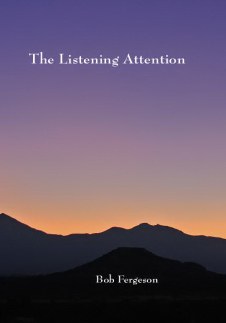 |
This Missal re-examines the listening attention. This childlike awareness lies buried under the so-called consciousness of our experienced-based personality. A non-judgmental attention which serves as a link between the manifest and unmanifest, it enables us to see both inner and outer, and thus come to an understanding of what we are. This attention has been mentioned often in esoteric literature, being called "seeing", "The Child", and the "Intermediary." All point to the same innate yet living awareness found within us all.
While all of us are born with this innate spontaneous awareness, it is soon covered over by the environment and the necessities of life. We develop a personality, an interface with our circumstance, and forget the original innocent state of being. Paradoxically, this is how it should be. Life, nature, and necessity will have their day, the experiences of life will create the experiencer. We will need a healthy mind and a well-formed personality to keep us energized and capable on our journey. Nothing can be accomplished from an ego that is not practically grounded, even though we may come to transcend it. Later, after we have taken enough knocks to the head, we come to long for the simplicity of the forgotten child within. It may take awhile to see clearly what this longing actually points to.
Coming to a point in life where we realize that no matter how clever our ego becomes, no matter how astute we are at outwitting others and perhaps ourselves, we find we are running in circles. This limitation of the ego can be the source of tension to drive us inward in search of something better, something different. We may remember a sense of wonder, of completeness, something we had before time reactions of thinking and feeling took over. After the ego has formed, another adventure awaits, that of returning through our mind of thought and experience to a new yet old way of seeing. This basic attention is aware, but not conceptually based, and is the door to the divine realm within.
The following illustration shows us the difference between the old man and the child, the ego and the listening attention. Our path from innocence to the old man is formed naturally by the actions of nature and environment, but the return to innocence is not guaranteed. It is not made through belief or wishful thinking, by reading of it in books and then declaring ourselves to be the One, and thus nothing needs to done. It is also not a path of endless 'learning', of continual becoming, getting better and better forever. It is a paradox; a path of hard work, but one where we arrive where we began.
Once upon a time, two friends were having coffee together, looking out the window at the trees. One remarked that a certain tree was called a western cedar, and that he could identify it without fail. Suddenly, a look of sadness crossed his face. "I can't look at that tree without seeing it as a 'western cedar'." He had realized that words and thinking were his only view, that something important within him had been lost. The other friend had quite a different expression. He saw the trap his buddy was caught in, and had a glimpse of the way out. As he gazed at the tree, he noticed he could switch back and forth between two radically different views. One, the paradigm of words, thoughts, and feelings, laid a thick veil over the tree, declaring it was a concept based on experience. This was the view in which his friend was trapped. It was nearly solid, and kept the actual perception of the 'tree' hidden beneath a cloud of thought and memory. The other view, the one he realized he had almost forgotten, was one of wonder and clearness. There was no 'tree' or anything else, but there was. Everything was as new, but not differentiated. He knew not what he was looking at, but this in itself was all that was needed to know enough. The view was simple, obvious, and without description. It left room for possibility, being infinite in scope. There was no memory or experience to rob him of the moment. He never forgot the gift of honesty his friend had given him. By admitting his dilemma of mind, the trap of ego and conditioning, the friend had shown him the trap of experience, and the freedom of the listening attention.
|
 |
It starts with the work of self-observation. We begin this looking at ourselves when we begin to doubt. This doubting may begin through trauma, or through the prodding of our intuition. It may come from being humbled and realizing we are not in control. Whatever knocks the ego out of the way just long enough to allow a glimpse beyond, is our saving grace, though we may not see it as such at the time. Our obsessions and desires, our fears and craving for security, will be dearly threatened. In their place may come a sense of a higher power, something greater than ourselves as bodies or minds. Now the work starts in earnest, for we see that our mind will defend itself, and its ways are a slippery labyrinth indeed.
|
In the spiritual search, the quest for true self-definition, we soon come to the realization that our best efforts, and even our very selves, are mechanical and reactive. A different level of seeing is needed, a pure awareness that is not itself a product of the world or mind, but primary to the reaction pattern we call ourselves. A listening which is attentive yet not reactive, and unaffected by circumstance and the constant changes of thought and mind.
|
 |
I believe it was the Hunas who said the human being had three bodies. One, the middle self, was what we have become through experience, being the personality or individual mind formed from life. This is the most unreal of the three. The higher self is the real one, but is lost from direct view. It cannot be reached through the middle self, but only through an intermediary, the lower self. This self is simple, primary to the cogitations of the mind, but has a direct connection to the higher. It can receive from the higher. First, we find the child within, then, by becoming this direct seeing, this listening, we find our way back to the higher awareness within, to what we really Are.
|
" The child-like state is the state that every human alive is trying to get to. When I was about twelve, I came to the conclusion that adults were insane. They were as rammy as billy goats, and so is everyone I've ever met. Until I meet an adult with the flowering feeling and drive of a young child, I will know I've never met a sane person. "
- Jim Burns
|
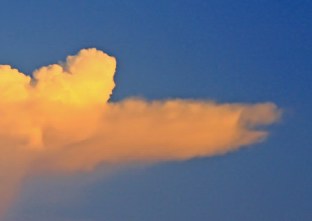 |
This path back to our original awareness is one of retreat rather than one of addition. The psychological work involved is the removal of false concepts and beliefs that cloud our vision. Retreating from what we find to be less real requires a development of the intuition, and a healthy body and mind. We cannot take our obsessions along with us if we hope to find the Truth. On the other hand, awareness is not dependent on action, meaning we can be aware of ourselves, and what we are doing. Acting the part of a saint does not make one aware. We struggle to see ourselves until we are forced to give up, and through this surrender become the very awareness we have been trying to grasp, thus letting go of our vain attempts to control and change. We let the innate powers within us that are programmed to take care of our body and mind run the show, for we are now free from grasping at outside illusions to give us meaning and peace. We have found ourselves and no longer see the world as greater than us. Our meaning is our Self, and our seeing is our being.
"Now, with absolute assurance, I can tell people, old and young, their lessons can be learned under the most difficult and trying circumstances. Better that we leave our nets after we've learned their lessons. Better that we call on the Child because the Child knows what to do. The Child and the Presence are the same one Presence and It is right here where we are, transcending this world's time and space."
- William Samuel
by
Jim Burns, from his book
At Home With the Inner Self
and
by
Maurice Nicoll
|
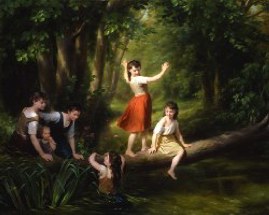 |
- Related Sites -
The Listening Attention: A companion site to the Missal which examines the need for direct perception in the spiritual quest.  In the spiritual search, the quest for true self-definition, we soon come to the realization that our best efforts, and even our very selves, are mechanical and reactive. A different level of seeing is needed, a pure awareness that is not itself a product of the world or mind, but primary to the reaction pattern we call ourselves. A listening which is attentive yet not reactive, and unaffected by circumstance and the constant changes of thought and mind. http://www.listeningattention.org/
In the spiritual search, the quest for true self-definition, we soon come to the realization that our best efforts, and even our very selves, are mechanical and reactive. A different level of seeing is needed, a pure awareness that is not itself a product of the world or mind, but primary to the reaction pattern we call ourselves. A listening which is attentive yet not reactive, and unaffected by circumstance and the constant changes of thought and mind. http://www.listeningattention.org/
 In the spiritual search, the quest for true self-definition, we soon come to the realization that our best efforts, and even our very selves, are mechanical and reactive. A different level of seeing is needed, a pure awareness that is not itself a product of the world or mind, but primary to the reaction pattern we call ourselves. A listening which is attentive yet not reactive, and unaffected by circumstance and the constant changes of thought and mind. http://www.listeningattention.org/
In the spiritual search, the quest for true self-definition, we soon come to the realization that our best efforts, and even our very selves, are mechanical and reactive. A different level of seeing is needed, a pure awareness that is not itself a product of the world or mind, but primary to the reaction pattern we call ourselves. A listening which is attentive yet not reactive, and unaffected by circumstance and the constant changes of thought and mind. http://www.listeningattention.org/The Headless Way: The Work of D.E. Harding. This method of self-enquiry, sometimes called 'headlessness' or 'seeing who you really are' ('seeing' for short), is a contemporary approach which investigates the question Who am I? and suggests that you can see Who you really are here and now. It provides simple but deep awareness exercises that direct you to this Seeing within yourself. http://www.headless.org/english-welcome.htm
William Samuel & Friends: Beloved, well-known William Samuel (1924-1996) 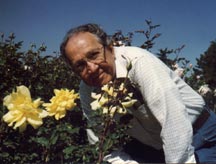 was a prolific writer of truth, science, religion, and spiritual awakening. Those who knew him best considered him a humble, soft-spoken teacher who communicated truth in a unique, powerful way that revealed the presence in the here and now-and brought healing on its wings. Many who listened to Samuel speak, who read his books, or who visited him in Alabama who could synthesize teachings from both east and west to offer a clear explanation of the nature of enlightenment. He taught using simple language best summed up in this, one of his well known sayings: "There is no way there, but to be there." - from the William Samuel and Friends website, http://www.williamsamuel.com/
was a prolific writer of truth, science, religion, and spiritual awakening. Those who knew him best considered him a humble, soft-spoken teacher who communicated truth in a unique, powerful way that revealed the presence in the here and now-and brought healing on its wings. Many who listened to Samuel speak, who read his books, or who visited him in Alabama who could synthesize teachings from both east and west to offer a clear explanation of the nature of enlightenment. He taught using simple language best summed up in this, one of his well known sayings: "There is no way there, but to be there." - from the William Samuel and Friends website, http://www.williamsamuel.com/
 was a prolific writer of truth, science, religion, and spiritual awakening. Those who knew him best considered him a humble, soft-spoken teacher who communicated truth in a unique, powerful way that revealed the presence in the here and now-and brought healing on its wings. Many who listened to Samuel speak, who read his books, or who visited him in Alabama who could synthesize teachings from both east and west to offer a clear explanation of the nature of enlightenment. He taught using simple language best summed up in this, one of his well known sayings: "There is no way there, but to be there." - from the William Samuel and Friends website, http://www.williamsamuel.com/
was a prolific writer of truth, science, religion, and spiritual awakening. Those who knew him best considered him a humble, soft-spoken teacher who communicated truth in a unique, powerful way that revealed the presence in the here and now-and brought healing on its wings. Many who listened to Samuel speak, who read his books, or who visited him in Alabama who could synthesize teachings from both east and west to offer a clear explanation of the nature of enlightenment. He taught using simple language best summed up in this, one of his well known sayings: "There is no way there, but to be there." - from the William Samuel and Friends website, http://www.williamsamuel.com/Be Still & Know: A Simple Technique for Overcoming Stress & Illness. Roy Masters meditation technique show how to free oneself from the emotionally based patterns of thinking we have come to be identified with through the traumas of life. Be Still and Know is a simple technique that will provide almost immediate help for those with mental, emotional and physical symptoms rooted in anger, fear and doubt. This simple concentration-observation exercise with Judeo-Christian roots enables the practitioner to remain calm and patient even in the face of extreme stress and cruelty. http://www.fhu.com/meditation.html
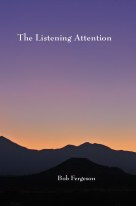 |
The Listening Attention is our innate ability to observe the world and ourselves without identification.
The essays, poetry and insight from the Listening Attention web site are now available in book form:
|
 |
Tricks and Traps
Trap: Identified with an 'outside' state of mind. Much of our thinking may not be our own, meaning we may still be under the influence of an old state of mind we picked up from an outside source, such as parents, school, job, spouse, or friends. This pervasive background will color all our thinking, and most important, we are probably unaware of it.
Trick: Using the listening attention to catch a glimpse. Try a simple trick to see if you are a victim of identification. You'll have to be quick and subtle, and look closely at your own reactions. When watching the news, browsing the web, or out in public, look for your mind's reactions to incoming perceptions, to the first unqualified reaction you see before you have a chance to edit. Any surprises? We can catch a state of mind in two ways: one is that we see the first reaction to be based on a way of thinking/feeling that later is proven to be false, or not factual. Two, we may get a glimpse of things as the child in us sees them, and see that this is a more accurate perception, but one we refuse to hold to, for it contradicts our 'knowing' or cleverness. What defines your perceptions?
Commentary ___________________

The Gumb
"It is absolutely essential that we actually get in touch with the eternal Child." - William Samuel
I've found dreams to be a valuable source of self-knowledge through the years, and a great trick to get around the ego's ruthless tactic of editing out anything truly useful in our search. The following dream is no exception. I was in isolation, a spiritual retreat, and had a curious dream. I wrote it down, and later, when back from the retreat, took the time to research the information. Even now the dream stands out, for it describes a fundamental aspect of us all, one that I continually find described by others in their own words, too.
The dream revolved around a character called the 'gumb'. This term was accepted by me, as witness to the dream, being part and parcel to the world the dream presented. Only later in so-called waking life did I find the term curious. The character it described was an ordinary sort of fellow, of average height, build, and appearance, but his manner was most unusual. I was shown a series of vignettes where these characteristics were illustrated, as the dream narrator filled in the details.
In the first scene, the gumb was attacked with spears by a swarm of meanies. Being outnumbered and with no visible means of defense, I was flabbergasted at the result. He was able to simply wave off the spears, and continue on his way unharmed. Next, his bug-like adversaries built a series of walls from cement blocks in attempts to hem him in. Again, he simply waved his way through, never breaking stride. He never lost his cool or reacted emotionally in any way to these situations. He didn't indulge in having his feelings hurt or stop to place blame, he just kept moving. He did not attack or retreat but held to his way, without hurry or delay.
While I watched in amazement, the narrator filled in the story. He told me the man was called the gumb. The reason he could not be hurt or stopped was because he did not carry a watch, and was not afraid to gamble. I remembered these words, and later, back in the world of organized information, I wrote them down and began the search for this word 'gumb'.
While later on I found several different versions and roots of the word, the initial search was by far the most informative, and I believe, the most accurate. It resolved the dream for me. I found the word 'gump' in a large dictionary, and was surprised at the result. The word was Scottish in origin, and originally meant fishing in the dark, to search for with the hands, to grope and catch fish under banks or stones. It was said it later came to mean searching for insights, having no fear, and not being overly concerned with the outcome. To muddle through difficult situations thanks to a series of lucky chances. It is the root of the modern term 'gumption', meaning the courage to act, and the practice of common sense and presence of mind. The meaning of not wearing a watch and not being afraid to gamble began to make sense.
The gumb's way of living contrasted heartily with my own, for I was fear-based and living from a state of mind handed down through generations having lived in fear and desire as their basis, too. Now, don't get this wrong, no one in this line of misfortune is to blame, for no one was aware. They were not aware that they were identified with a particular state of mind. This state of mind called the shots, and even defined perception at a basic unseen level. It gradually covered over the innocent perception of the children of each succeeding generation with a fog of fear, judgment and desire, and transformed them into identified, reactive-oriented robots, each with a pride-based ego that they were aware individuals with a handle on their lives, and the meaning of it all. What a trap, and what a joke. No wonder the image of the gumb and his way of action was so appealing.
As time went by, I discovered this path or way of being in the writings of others, and in the actions of a few. William Samuel's Child within, Richard Rose's between-ness, Douglas Harding's headless seeing, the Puer or Intermediary of Maurice Nicoll, and many other examples of this pure state of being. While this listening attention, as I've come to call it, is not the final state, it is the door. It is the timeless portal between the manifest and the unmanifest, the gateway to within. It is how to live in the world, but not be of the world. The ego state of mind may be good at managing the world of daily affairs, but it cannot go beyond. The child within us transcends the world, being our link to the formless. We then see why the ancients called it the Son, and that the Son and the Father are One.
The path to becoming the listening attention begins with self-observation. The hard work of 'seeing' what we really are, and what we are not. Later, we may find that we were the Child all along and had just become lost, but without this journey into time and space, we would not value our true state. To begin the homeward journey, look quickly, subtlety, without the editing of states of mind. In the moment of perception there lies a door, an attention that does not define, but simply sees. The nostalgic longing we feel at times for a better life, a real home, is a thread back to this child within. Follow it, and discover your own inner child, the gumb.
Bob Fergeson
- Quotes -
Comic Philosophy
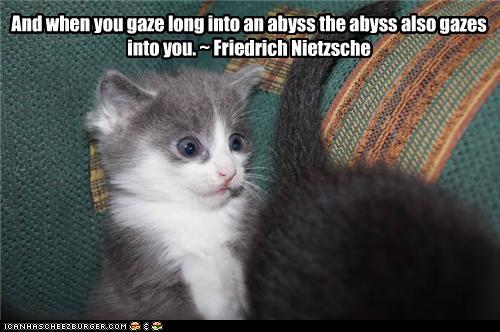
"Democracy is the theory that the common people know what they want and deserve to get it good and hard." - H.L. Mencken
" If nothing else works, a total pig-headed unwillingness to look facts in the face will see us through." - The Black Adder
" Creative minds always have been known to survive any kind of bad training." - Anna Freud
" The road to truth is long, and lined the entire way with annoying bastards." - Alexander Jablokov
09/18/10
Copyright 2010 - Robert Fergeson. All Rights Reserved.